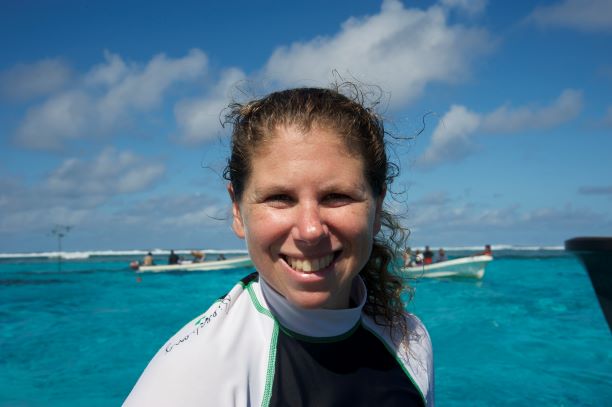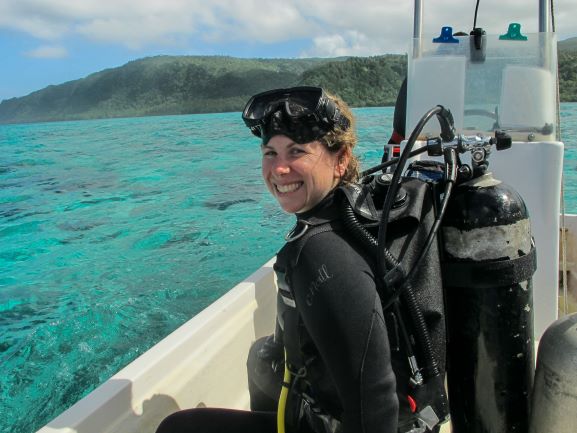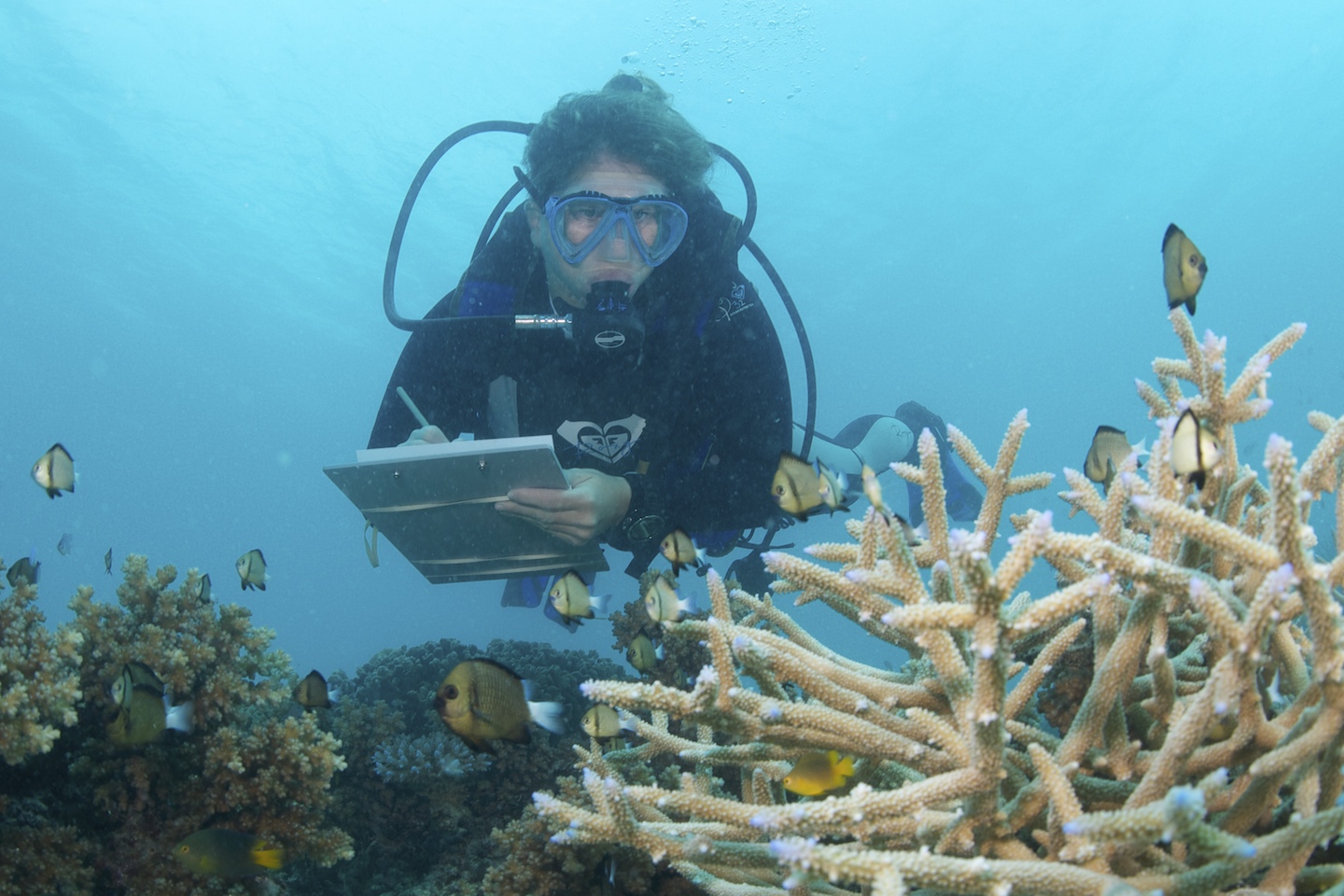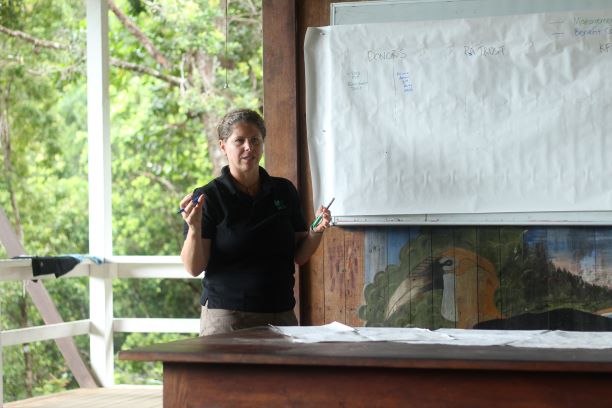
Stacy Jupiter oversees the Wildlife Conservation Society's programs and projects in Fiji, Papua New Guinea, Solomon Islands and Vanuatu. She specializes in community-based management, integrated land-sea management and coral reef ecology. Her PhD is from the University of California, Santa Cruz. Stacy is based in Suva, Fiji and has served two terms on the SCB Oceania Section board! Stacy is also a newly named MacArthur Fellow!
SCB held a Q&A with Stacy to learn more about her career path, what she is currently working on, and what she liked most about serving on the Oceania Section board.
When did you know that you wanted to work in conservation and what fuels your passion for working in wildlife conservation?
I have always loved nature. I wanted to be a marine biologist since I was 12 years old. At around the same time, I convinced my parents to let me paint a mural of a rainforest to reef scene on my bedroom walls so I could be surrounded by nature. There was one palm that I never finished, which looking back now, seems like a metaphor that conservation work is never done.
How did you end up where you are now? Was your career path clear, or did unforeseen opportunities come about at the right times?
I credit both dogged pursuit and sheer chance as to how I ended up where I am today.
There is no real set path to becoming a marine biologist or conservationist like there is to be, say, a doctor or lawyer. When I was an undergraduate, I had the opportunity to spend time abroad in Australia where I did volunteer work in some marine labs at the University of Sydney and the University of New South Wales. I got great mentoring experience there in terms of what it takes to do research science.
In addition to knowing that I wanted to be a marine biologist, I also knew from my teenage years that I wanted to join the Peace Corps. I received a placement as a rural fisheries extension officer in Gabon, central Africa, where I spent two years working with farmers to build ponds for tilapia aquaculture and integrate them with their bush plantations. During the rainy seasons in Gabon, I saw huge amounts of mud get into the waterways and head downstream. It was then that I first started thinking about the connections between the land and sea and how this sediment might influence downstream systems. So following my Peace Corps service, I went to graduate school and ultimately embarked on a PhD investigating how land cover change affects water quality and downstream ecosystems, focused in the nearshore Great Barrier Reef and adjacent Pioneer River catchment.
As I was finishing up my PhD, I knew that I wanted to take the skills and knowledge that I had acquired both in the Peace Corps (in terms of community work) and in graduate school (in terms of applied science) to work for a conservation NGO on natural resource management. But I didn’t know anything about any of the NGOs at the time. I just happened to go to a guest lecture by Dr. Peter Walsh on the spread of Ebola among great ape populations, principally because I was interested to hear about research from Gabon. He had worked with the Wildlife Conservation Society (WCS) and was kind enough to later talk to me about the organization and other NGOs. I instantly liked what he had to say about WCS – that they tend to take a bottom-up approach to conservation, working closely with local people, with an emphasis on science to design robust management interventions. I initially applied to work with the WCS marine program in Papua New Guinea, but ended up taking a postdoc position in Australia because I hadn’t heard back from WCS. I stayed in touch with the organization, however, and a couple years later, another position came up in Fiji. I was originally hired as an Associate Conservation Scientist, then within a year was running the Fiji Program. In 2014, I hired a fantastic Fijian scientist and conservationist (Pew Fellow Sangeeta Mangubhai) to take my job and I moved into the role of Melanesia Regional Director with the organization.

What are you currently working on (professionally?)
Over the past few years, in addition to a large amount of administrative work I do to support our programs in Fiji, Papua New Guinea and Solomon Islands, I’ve had three broad focal areas. The first has been a long time focus on trying to understand drivers of effectiveness of locally-managed marine areas (LMMAs) for achieving social and ecological outcomes. I’m really passionate about making sure that the tools employed within LMMAs are fit for purpose in terms of being able to achieve local objectives for food security and livelihoods.
My second more recent focus has been through work with a large number of collaborators around the world to promote a biocultural approach to conservation, whereby local people are encouraged to drive initiatives to make sure that the research questions and management interventions are leading to their desired outcomes. After over a decade of working in the Pacific, I have seen a lot of initiatives fail because they are designed with western worldviews that don’t take into account local cultural practice and local definitions of well-being. Even very well-intentioned conservation and management initiatives can get things very wrong if they do not recognize how and why local people access and use the natural environment.
Thirdly, I have long promoted integrated management – across ecosystems, sectors and disciplines. I am currently part of a large project in Fiji, over a decade in the making, that is working towards co-designing watershed interventions with local communities to both reduce the spread of water-related disease (in people) and improve downstream freshwater and marine ecosystem and resource condition. I feel like this model of management, focused on planetary health that explicitly recognizes the connections between people and the environment, is the wave of the future.
What does a typical work day look like for you?
One of the things that I most enjoy about my work is that I have no typical work day. Every day and week is unique. During the past week, I have: taken a film crew to get footage of our teams collecting baseline water quality and health data in an upstream village in Fiji; discussed with stakeholders from government, civil society and industry the most appropriate legal pathways to create marine protected areas at the provincial scale in Papua New Guinea; listened to local villagers in New Ireland Province, Papua New Guinea, discuss enforcement challenges within their LMMA; and assisted our marine teams with project coordination on overlapping and complex grants.
What is your favorite part about working and living in Fiji?
My favorite part of my work has always been interacting with local people, hearing their stories and exchanging knowledge about the environment. People who have strong connections to the land and sea have an incredible wealth of knowledge about how species may be responding to climate change, what are the best methods for harvesting resources, but also what practices can be put in place to ensure that harvests are sustainable.
Describe what your perfect weekend would look like.
Someday, my husband will finish up the boat that he is restoring and we will spend our weekends fishing, diving and visiting nearby islands. In the meantime, I like to get out or near the water as much as possible with my 3-year old son to look at marine critters, play in the sand, mangroves and mud flats, and pass on that love of nature.
What’s your favorite thing about being on the Oceania Section board?
I thoroughly enjoyed my two terms on the Oceania Section board, principally because of the motivation from all of the Board members to think bold and expand the section’s influence. This was done in a number of ways, including through: rotating the section conference between Australian, New Zealand and Pacific Island venues every two years; hosting public events on sometimes controversial conservation topics to try to reach an audience beyond our Society (see, for example, the public debate on the extinction crisis that was broadcast by ABC Radio in Australia); publishing policy white papers on topical issues (e.g., The plight of New Zealand’s freshwater biodiversity); and running capacity building workshops targeted for students on presenting at conferences and publishing in journals.When did you know that you wanted to work in conservation and what fuels your passion for working in wildlife conservation?
I have always loved nature. I wanted to be a marine biologist since I was 12 years old. At around the same time, I convinced my parents to let me paint a mural of a rainforest to reef scene on my bedroom walls so I could be surrounded by nature. There was one palm that I never finished, which looking back now, seems like a metaphor that conservation work is never done.

